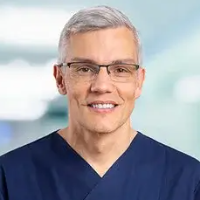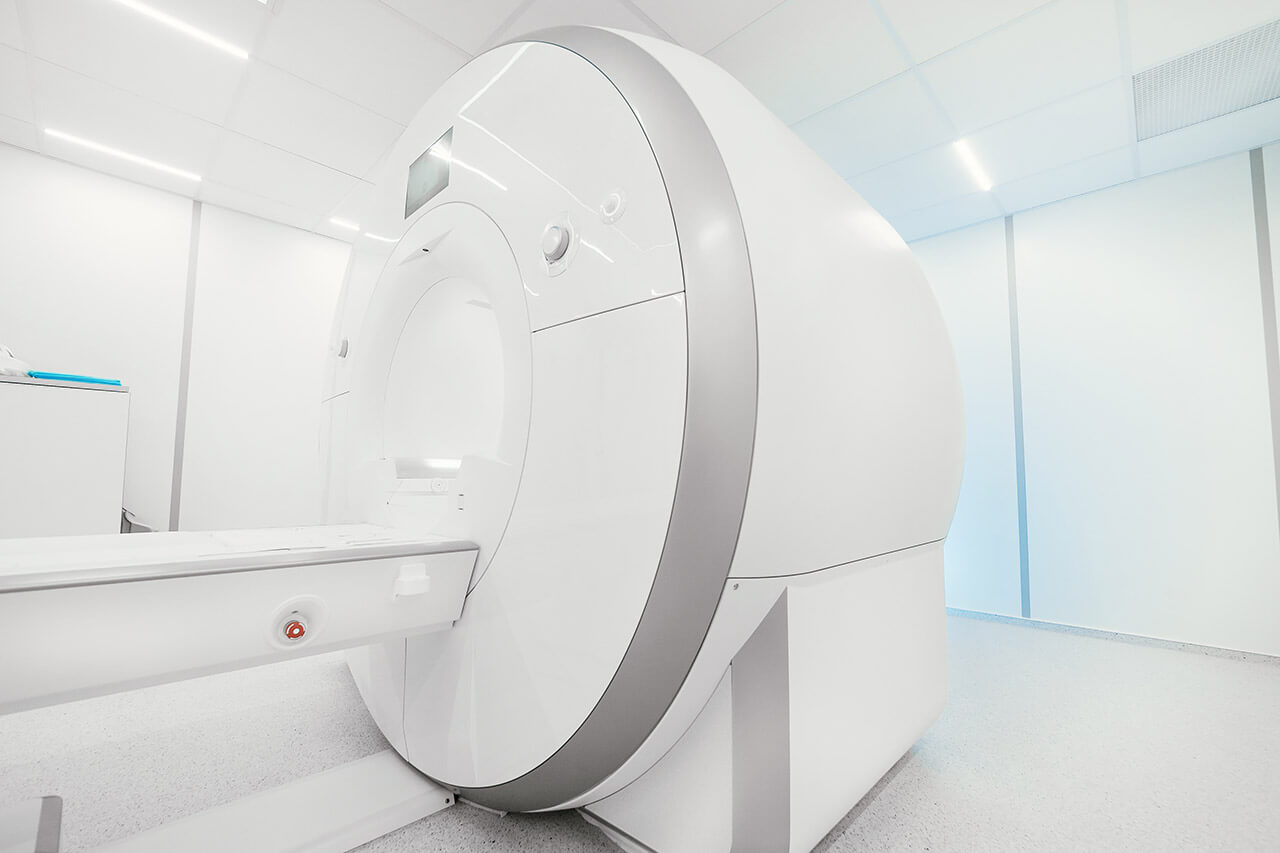
The program includes:
- Initial presentation in the clinic
- Clinical history taking
- Review of medical records
- Physical examination
- Neurological examination (if indicated)
- Laboratory tests:
- Complete blood count
- Biochemical blood tests
- Inflammation indicators (CRP, ESR)
- Coagulation tests
- Chest MRI/CT scan
- Preoperative care
- Endoscopic thymectomy
- Histological examination of the removed tissues (if indicated)
- Symptomatic treatment
- Cost of medicines and medical materials
- Nursing services
- Control examinations
- Full hospital accommodation
- Elaboration of further recommendations
Indications
- Treatment-resistant myasthenia gravis
- Thymus size under 8 cm
How program is carried out
Day 1. Initial presentation at the clinic. After consultation with the attending physician, examination and neurological examination, the patient undergoes the necessary laboratory and instrumental examination.
Day 2. On the 2nd day of hospitalization, after receiving the examination results and their assessment by the attending physician, the operation is performed under general anesthesia. The surgeon endoscopically removes the thymus gland and anterior mediastinal fat through the transcervical approach. With endoscopic surgery, there is no need to open the sternum, as the surgery is performed through a small incision in the neck. This allows the patient to recover faster after surgery and to reduce pain in the postoperative period. The operation ends with the suture of the soft tissues and skin. If necessary, drainage is installed in the anterior mediastinum. The patient is disconnected from the ventilator. After the restoration of spontaneous breathing he is transferred to the intensive care unit. As a rule, the operation lasts up to 1-1.5 hours.
From day 3. In the absence of complications and good general condition, the patient is transferred from the intensive care unit to a regular ward. If positive dynamics is present and complications are absent, the patient is discharged from the hospital on average at day 5.
Required documents
- Medical records
- Chest MRI/CT scan (not older than 3 months)
- Biopsy results (if thymic carcinoma is suspected and if available)
Service
You may also book:
 BookingHealth Price from:
BookingHealth Price from:
About the department
The Department of General and Abdominal Surgery, Hernia Surgery, Endocrine Surgery, Thoracic Surgery at the Martha-Maria Hospital Munich offers the full range of top-class surgical treatment in accordance with current clinical protocols. The department's specialists focus on patients with pathologies of the gastrointestinal tract, lungs and respiratory tract, as well as endocrine diseases. The department also performs surgery for inguinal hernias. The operating rooms of the medical facility have state-of-the-art equipment, including those adapted for sparing laparoscopic interventions. The department's surgeons prefer minimally invasive surgical techniques, since recovery after such operations is many times faster than after classical open interventions. The department's surgical team regularly demonstrates high treatment success rates. At the same time, the medical facility holds a leading position in the field of endocrine surgery at the European and international levels. The Head Physician of the department is Prof. Dr. med. Roland Ladurner.
The department is a recognized Center for Thyroid and Parathyroid Surgery, which performs more than 2,000 surgical interventions on the thyroid gland and about 300 operations on the parathyroid glands every year. Over the years of clinical practice, the department has performed more than 29,000 thyroid surgeries and about 3,000 parathyroid interventions. Not every medical facility in Europe has such experience in the field of endocrine surgery, which contributes to the high reputability of the department at the international level.
It is worth noting that the department is the only medical facility in Bavaria that specializes in ultrasound therapy for benign thyroid neoplasms. This type of therapy is a new and especially sparing alternative technique for the treatment of thyroid tumors. The essence of the procedure is the use of therapeutic ultrasound, which works on the principle of a magnifying glass – the ultrasound rays are focused at a single point, which leads to local heating of tissues in the target site (up to about 85°C), and destruction of pathological foci. At the same time, healthy tissues are not affected. The procedure is completely painless. The ultrasound therapy is suitable for the treatment of benign thyroid nodules and can also serve as an alternative to radioiodine therapy.
The department's competence also includes surgical interventions on gastrointestinal organs, emergency surgery and emergency care for injuries. With appropriate clinical indications, operations are performed using minimally invasive techniques. The department's surgeons also have all the technical resources and the necessary qualifications for performing open surgical interventions. Thus, an individual treatment is selected for each patient, taking into account the particular clinical case. Along with optimal surgical treatment, the safety of patients and the prevention of complications are a key task of a competent team of doctors.
In the field of hernia repair surgery, special attention is paid to the treatment of inguinal hernias. Pathology is a protrusion of tissues and organs of the abdominal cavity beyond its limits, into the inguinal area. Depending on the stage of the disease, the department's surgeons perform open or minimally invasive surgical interventions. In the first case, the specialists resort to plastic surgery of the inguinal canal using the Shouldice or Lichtenstein technique. With appropriate clinical indications, sparing laparoscopic operations are performed.
An equally important area of specialization of the medical facility is thoracic surgery. The department regularly performs surgical interventions on the lungs and other thoracic organs. Particular attention is paid to the surgical treatment of thoracic cancers. A huge advantage for patients is the performance of minimally invasive interventions on the lungs (video-assisted thoracoscopic surgery), which provide a quick recovery of the patient, minimize blood loss, and also reduce the risk of postoperative complications. For example, minimally invasive operations are performed for recurrent pleurisy, spontaneous pneumothorax, and inflammatory lung and pleural diseases.
The department's range of surgical services includes:
- General and abdominal surgery
- Surgical treatment of esophageal pathologies (for example, in Zenker's diverticulum)
- Surgical treatment of diaphragm pathologies (for example, in hiatal hernia)
- Surgical treatment of stomach pathologies (for example, in ulcers, malignant tumors)
- Surgical treatment of small intestine pathologies (for example, in Meckel's diverticulum)
- Surgical treatment of colon pathologies (for example, in diverticulosis, polyps, malignant tumors)
- Surgical treatment of inflammatory bowel disease (Crohn's disease, ulcerative colitis)
- Diagnostic and therapeutic endoscopic procedures on gastrointestinal organs
- Surgical treatment of hernias
- Surgery for inguinal hernias: Shouldice technique for inguinal canal repair, Lichtenstein technique and laparoscopic operation
- Endocrine surgery
- Surgical treatment of thyroid pathologies, including thyroid cancer
- Surgical treatment of parathyroid pathologies
- Ultrasound therapy for the treatment of benign thyroid neoplasms (as an alternative to surgical treatment)
- Thoracic surgery
- Surgical treatment of lung cancer and lung metastases, as well as malignant tumors of the mediastinum, thoracic wall and pleura
- Surgical treatment of mediastinal diseases (for example, thymomas, lymphomas, germ cell tumors)
- Surgical treatment of chest wall tumors
- Palliative interventions (for example, pleurodesis, permanent pleural drainage)
- Surgical treatment of infectious lesions of the respiratory system (for example, pleural empyema, lung abscess, bacterial lung tissue destruction)
- Surgical treatment of benign diseases of the lungs, mediastinum, and thoracic wall (for example, hamartomas, bronchiectasis, cysts, lung sequestration)
- Surgical treatment of thoracic injuries (for example, hemothorax, rib fractures and their complications)
- Surgical treatment of pneumothorax
- Surgical treatment of hyperhidrosis
- Surgical treatment of tracheal diseases (for example, tumors, stenosis)
- Lung volume reduction surgery as a palliative surgical care for patients with advanced pulmonary emphysema
- Minimally invasive surgery
- Laparoscopic interventions on the thyroid and parathyroid glands
- Laparoscopic interventions on the adrenal glands
- Laparoscopic interventions on the gallbladder
- Laparoscopic interventions on the caecum
- Laparoscopic interventions for inguinal hernias
- Laparoscopic removal of adhesions in the abdominal cavity and laparoscopic interventions on the intestines
- Minimally invasive thoracic surgery (video-assisted thoracoscopic surgery)
- Other surgical options
Curriculum vitae
Professional Certification
- Board certification in Surgery.
- Board certification in Abdominal Surgery.
Positions
- Managing Senior Physician, Department of General, Abdominal and Transplant Surgery, University Hospital of Ludwig Maximilian University of Munich, Munich, Germany.
- From January 2022 Head Physician of the Department of General and Abdominal Surgery, Hernia Surgery, Endocrine Surgery, Thoracic Surgery at the Martha-Maria Hospital Munich.
Photo of the doctor: (c) Diakoniewerk Martha-Maria e.V.
About hospital
The Martha-Maria Hospital Munich is one of the medical facilities of the Martha-Maria Diaconal Enterprise, as well as an academic hospital of the Ludwig Maximilian University of Munich.This means a combination of state-of-the-art medicine with a humane attitude towards the patient's worries and his life situation. The hospital began its work back in 1889, so it is deservedly proud of its rich traditions and vast clinical experience.
With advanced technical equipment, modern operating rooms and highly qualified medical staff, the medical facility has the status of one of the leading in Bavaria. The entire staff of the hospital follows Christian traditions, which contributes to a humane and sympathetic attitude towards each patient.
The hospital offers such medical fields as general and abdominal surgery, thoracic surgery, endocrine surgery, otolaryngology and pulmonology. A highly qualified team of doctors works in each area, whose medical knowledge and experience allow them to deal with the treatment of even the most complex and rare clinical cases.
The professionalism and talent of the doctors of the hospital deserve special attention. All the specialists undergo a rigorous selection, so that patients can be sure that the treatment will be carried out by highly qualified doctors with a worldwide reputation. The doctors regularly undergo advanced training courses, attend symposiums and conferences, including international ones, where they learn about innovations in medicine and share their experience with other doctors.
The hospital has 120 beds for inpatient medical care. The quality of medical services and patient care at the hospital meets international standards. In addition, the medical center is located in a quiet and picturesque green area on the outskirts of Munich, which contributes to a rapid recovery and a calm state of mind for patients.
Photo: (с) depositphotos
Accommodation in hospital
Patients rooms
The patients of the Martha-Maria Hospital Munich live in comfortable single, double or triple rooms. The standard patient room includes a comfortable automatically adjustable bed, bedside table with a pull-out tray, TV, radio, telephone and Wi-Fi (at extra charge). Each patient room is equipped with an ensuite bathroom with a shower and a toilet.
If desired, you can book your stay in the enhanced-comfort patient room, which faces south and has a balcony overlooking the park. These patient rooms include a bathroom (daily towel change) with a hairdryer, high-quality furniture, a refrigerator, a closet, a reading lamp, a TV (free of charge), a telephone (at extra charge), Wi-Fi and a safe.
Meals and Menus
The hospital offers three meals a day. Breakfast is served buffet style. Different types of menus are available daily for lunch and dinner, juices and fruits are offered as well.
If for some reason you do not eat all the foods, you will be offered an individual menu. Please inform the medical staff about your food preferences prior to treatment.
Further details
Standard rooms include:
Accompanying person
Your accompanying person may stay with you in your patient room or at the hotel of your choice during the inpatient program.
Hotel
You may stay at the hotel of your choice during the outpatient program. Our managers will support you for selecting the best option.




